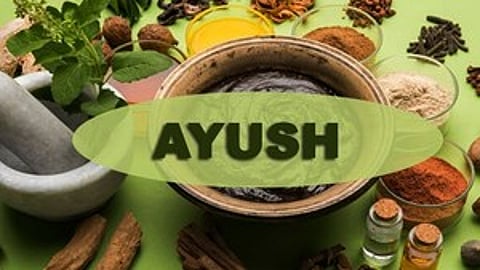

On December 30, 2024, the Government of Goa announced an increase in the monthly remuneration of AYUSH (Ayurveda, Yoga, Unani, Siddha, Homeopathy) doctors under the Directorate of Health Sciences to Rs 65,000 per month.
The notice added that AYUSH doctors would be entitled to all facilities available to MBBS doctors, who practice allopathy.
This move received some backlash from allopathy doctors on social media, who claimed that the government was giving undue benefits to AYUSH doctors, despite their course and workloads lacking the rigour of MBBS and allopathy residency.
Some allopathy doctors even claimed that AYUSH doctors were being allowed to practice allopathy, which they claim denies opportunities for MBBS doctors.
“There are instances of AYUSH doctors working in OPDs (Outpatient Departments) and emergency services. Due to this, allopathy doctors are forced to seek lesser paying jobs, or are left without adequate work,” claimed Dr Dhruv Chauhan, National Council Member, Indian Medical Association-Junior Doctors’ Network (IMA-JDN).
He said that most AYUSH doctors lack the knowledge, expertise or authority to administer or prescribe drugs and treatments in allopathy. “As an allopathy practitioner, I cannot prescribe Ayurvedic or homoeopathic medicines to my patients, as I am not qualified to do so. The same is the case for AYUSH doctors,” he explains.
Dr Chauhan clarifies that AYUSH doctors being paid lucrative remunerations is not as big of a concern as their being allowed to practice allopathy.
The National Medical Commission (NMC) introduced the Registered Medical Practitioner (Professional Conduct) Regulations in 2022, prohibiting AYUSH doctors from prescribing allopathy medicines and treatments.
Despite this, several states in India, such as Maharashtra, Madhya Pradesh, Rajasthan, Bihar, Tamil Nadu and Uttar Pradesh allow AYUSH doctors to operate in primary and community health centres due to a shortage of healthcare professionals, especially in rural areas — a practice panned by critics as “mixopathy”.
“A majority of our population is comprised of poor people, to whom primary health centres offer affordable treatment. We AYUSH doctors ensure that affordable healthcare is delivered to the underprivileged sections of the society by keeping these health centres functioning,” says Dr Vinayak Tembhurnikar, an Ayurveda practitioner from Maharashtra and current past president of the National Integrated Medical Association (NIMA).
He adds that this gives AYUSH doctors the reach that allopathy doctors would not get in their whole careers.
Rural health statistics released by the Union Ministry of Health & Family Welfare in 2022 state that 8,709 AYUSH doctors were posted at 25,140 rural primary health centres and 541 at 5,481 community health centres.
“Students of AYUSH study pharmacology in their first year. We are equipped to practice both modern medicine and our disciplines under AYUSH. Moreover, the Maharashtra State Government allows us to prescribe allopathic medicines,” Dr Vinayak says.
“Wrong to say we have less workload,” AYUSH doctors say
Responding to claims about AYUSH doctors having less rigorous courses and workloads compared to MBBS doctors, Dr Vinayak says, “AYUSH doctors were instrumental in keeping hospitals running during the COVID-19 pandemic. It is unfair to write off our contributions to our healthcare system.”
According to some AYUSH practitioners, the reason for the perceived high workloads of allopathy doctors is the lack of emergency services in AYUSH departments.
“It is important to remember that a lot of AYUSH practices were either recent inventions, or were integrated into mainstream medical services much later than allopathy was. As a result, it is more established and has become the default mode of treatment for medical emergencies. Government regulations also uphold this. Due to this, allopathy doctors naturally have more number of patients to attend to,” says Dr Tarun Soni, a Homoeopathy doctor from Bhopal, Madhya Pradesh.
He adds that the lack of emergency services does not mean that AYUSH departments or hospitals do not have less patient count.
“The OPD of the National Institute of Homoeopathy in Kolkata is larger than that of the Government Medical College, Nagpur. In addition, in the Nehru College of Homoeopathy in New Delhi, patients arrive for checkup and consultation the night before the intended appointment,” he recalls.
Further, he says that homoeopathy and other disciplines under AYUSH are just as demanding as MBBS and allopathy. “Under homoeopathy, for example, we need to remember the names and properties of about 500 drugs for the same disease. Wouldn’t doing this require rigour and effort from students and doctors?” he asks.
AYUSH doctors believe that calling for their remunerations to be reduced would not do allopathy doctors any good. “If MBBS doctors are underpaid, they must demand that their remuneration be increased. How logical or fair is it for them to call for our remuneration to be reduced?” asks Dr Rishikesh Nagar, a postgraduate scholar at the Government Homoeopathic Medical College in Bhopal.
Reflecting on the matter, Dr Sharad Agarwal, former president of the IMA says, “AYUSH doctors are as much part of the medical fraternity as allopathy doctors are. They are legally allowed to practice their disciplines, and must not be treated as second class to MBBS doctors.”
However, he adds that it would be better for both AYUSH doctors and allopathy doctors to keep their practice limited to their disciplines, and not cross over.
